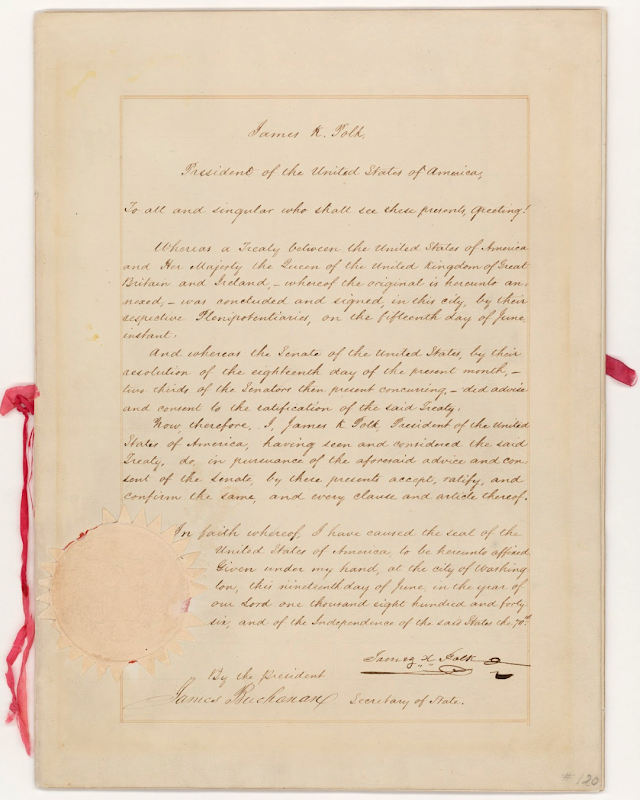On This Date In History
On June 15, 1846, representatives of Great Britain and the United States sign the Oregon Treaty, which settles a long-standing dispute with Britain over who controlled the Oregon territory. The treaty established the 49th parallel from the Rocky Mountains to the Strait of Georgia as the boundary between the United States and British Canada. The United States gained formal control over the future states of Oregon, Washington, Idaho and Montana; and the British retained Vancouver Island and navigation rights to part of the Columbia River.
In 1818, a U.S.-British agreement had established the border along the 49th parallel from Lake of the Woods in the east to the Rocky Mountains in the west. The two nations also agreed to a joint occupation of Oregon territory for 10 years, an arrangement that was extended for an additional 10 years in 1827. After 1838, the issue of who possessed Oregon became increasingly controversial, especially when mass American migration along the Oregon Trail began in the early 1840s.
American expansionists urged seizure of Oregon, and in 1844 Democrat James K. Polk successfully ran for president under the platform “Fifty-four forty or fight,” which referred to his hope of bringing a sizable portion of present-day Vancouver and Alberta into the United States. However, neither President Polk nor the British government wanted a third Anglo-American war, and on June 15, 1846, the Oregon Treaty, a compromise, was signed. By the terms of the agreement, the U.S. and Canadian border was extended west along the 49th parallel to the Strait of Georgia, just short of the Pacific Ocean.
Washington had been managing his family’s plantation and serving in the Virginia House of Burgesses when the second Continental Congress unanimously voted to have him lead the revolutionary army. He had earlier distinguished himself, in the eyes of his contemporaries, as a commander for the British army in the French and Indian War of 1754.
Born a British citizen and a former Redcoat, Washington had, by the 1770s, joined the growing ranks of colonists who were dismayed by what they considered to be Britain’s exploitative policies in North America. In 1774, Washington joined the Continental Congress as a delegate from Virginia. The next year, the Congress offered Washington the role of commander in chief of the Continental Army.
After accepting the position, Washington sat down and wrote a letter to his wife, Martha, in which he revealed his concerns about his new role. He expressed uneasiness at leaving her alone, told her he had updated his will and hoped that he would be home by the fall.
On June 15, 1917, some two months after America’s formal entrance into World War I against Germany, the United States Congress passes the Espionage Act.
Enforced largely by A. Mitchell Palmer, the United States attorney general under President Woodrow Wilson, the Espionage Act essentially made it a crime for any person to convey information intended to interfere with the U.S. armed forces prosecution of the war effort or to promote the success of the country’s enemies. Anyone found guilty of such acts would be subject to a fine of $10,000 and a prison sentence of 20 years.
The Espionage Act was reinforced by the Sedition Act of the following year, which imposed similarly harsh penalties on anyone found guilty of making false statements that interfered with the prosecution of the war; insulting or abusing the U.S. government, the flag, the Constitution or the military; agitating against the production of necessary war materials; or advocating, teaching or defending any of these acts. Both pieces of legislation were aimed at socialists, pacifists and other anti-war activists during World War I and were used to punishing effect in the years immediately following the war, during a period characterized by the fear of communist influence and communist infiltration into American society that became known as the first Red Scare (a second would occur later, during the 1940s and 1950s, associated largely with Senator Joseph McCarthy). Palmer, a former pacifist whose views on civil rights radically changed once he assumed the attorney general’s office during the Red Scare, and his right-hand man, J. Edgar Hoover, liberally employed the Espionage and Sedition Acts to persecute left-wing political figures.
One of the most famous activists arrested during this period, labor leader Eugene V. Debs, was sentenced to 10 years in prison for a speech he made in 1918 in Canton, Ohio, criticizing the Espionage Act. Debs appealed the decision, and the case eventually reached the U.S. Supreme Court, where the court upheld his conviction. Though Debs’ sentence was commuted in 1921 when the Sedition Act was repealed by Congress, major portions of the Espionage Act remain part of United States law to the present day.








No comments:
Post a Comment